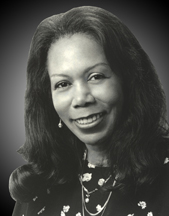1939 – 2002
Inspirational leader devoted to the needs of underserved populations
Growing up in rural Alabama, Tessie Anita Cleveland derived much gratification from doing for others. A natural caregiver, her strong, nurturing personality led to a long, successful career in medical social work.
Cleveland graduated from high school at 16 and entered Alabama State College, where she received her bachelor’s degree in business education. She earned her MSW from Atlanta University in Georgia in 1964 and was licensed that same year. She later attended the University of California, Los Angeles, where she earned a master’s in public health in 1975 and a doctorate in social policy in 1979.
Cleveland began her career with the Los Angeles County Department of Health Services in 1964 and remained with the county until her retirement in 2000. She was among the first 100 employees at Martin Luther King Jr./Drew Medical Center and held a variety of social work administrative positions at King/Drew and Women’s Hospital. Cleveland was a part-time instructor at California State University, Long Beach for years, becoming a fully tenured professor in 2002.
Her contributions to the community were acknowledged with several awards and citations. She is listed in the International Who’s Who in Community Service and Who’s Who in American Women. Cleveland was a recipient of the Koshland Award from the National Association of Social Workers and an Award of Excellence from the Department of Health Services. She was honored as Woman of the Year by the California State Legislature and inducted into the “Promenade of Prominence” in Ted Watkins Park in Watts for significant contributions to the South Los Angeles community.
Cleveland served as a mentor and trained numerous students from UCLA, USC and CSULB. A lifelong community activist and advocate for social justice, her professional achievements and contributions led to the development of more inclusive and culturally responsive networks of county social services. Her efforts to develop an organized county and state focus on medical conditions disproportionately plaguing African Americans expanded how human services were conceptualized and delivered to that community. She thoroughly understood community issues and knew how to effectively utilize power to influence discourse and social decisions.
Her commitment to advocacy and underserved populations is her enduring legacy, which continues to inspire social work professionals and students.
